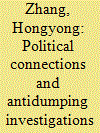| Srl | Item |
| 1 |
ID:
143392


|
|
|
|
|
| Summary/Abstract |
This study empirically analyzes the effect of agglomeration economies on firm-level product innovation (new products), using Chinese firm-level data from 1998 to 2007. In terms of new product introduction and new product output, I find that Chinese firms benefit from urbanization economies (as measured by the number of workers in other industries in the same city and by the diversity of industries in the same city). Conversely, I find no positive effects of localization economies (as measured by the number of other workers working for neighboring firms in the same industry and in the same city). These results suggest that in China, urbanization economies play an important role in fostering product innovation by urban size and diversity.
|
|
|
|
|
|
|
|
|
|
|
|
|
|
|
|
| 2 |
ID:
161839


|
|
|
|
|
| Summary/Abstract |
Do political connections affect antidumping (AD) investigations? To address this question, we use antidumping filings data combined with micro data on Chinese manufacturing firms for the period 1998–2007. The political connections of a firm are defined by whether it has state-owned capital or whether it is under the administration of central or provincial government. Estimating a probit model of AD filings at the firm level, we find that strong political connections significantly increase the likelihood of AD petitions and affirmative final dumping decisions. State-owned enterprises, firms affiliated with the central or provincial government, low productivity firms, and large firms tend to file AD investigations in China. The industry-level estimation results also confirm that the industries with a greater presence of state-owned enterprises are likely to apply for and receive trade protection from the Chinese government, controlling for import penetration, year, and industry fixed effects.
|
|
|
|
|
|
|
|
|
|
|
|
|
|
|
|
| 3 |
ID:
182786


|
|
|
|
|
| Summary/Abstract |
The tax incentives designed to stimulate firm investment may have a large and unexpected impact on labor market outcomes. Using a comprehensive data set on Chinese manufacturing firms during the period 1998–2007 with a difference-in-differences approach, we examine the impact of the value-added tax reform in 2004 on the firm-level labor market outcomes. We find that firms in eligible industries and pilot regions (treated firms) enjoying lower costs of purchasing fixed assets under the reform tended to increase capital investment and reduce employment simultaneously relative to firms that did not have tax incentives (the control firms). Compared with the control firms, the treated firms became more capital intensive but had declines in labor share in value added and average wage. We also find that the employment adjustment is associated with increase in the share of skilled workers in terms of engineers and technicians, but not workers with a college degree or higher.
|
|
|
|
|
|
|
|
|
|
|
|
|
|
|
|